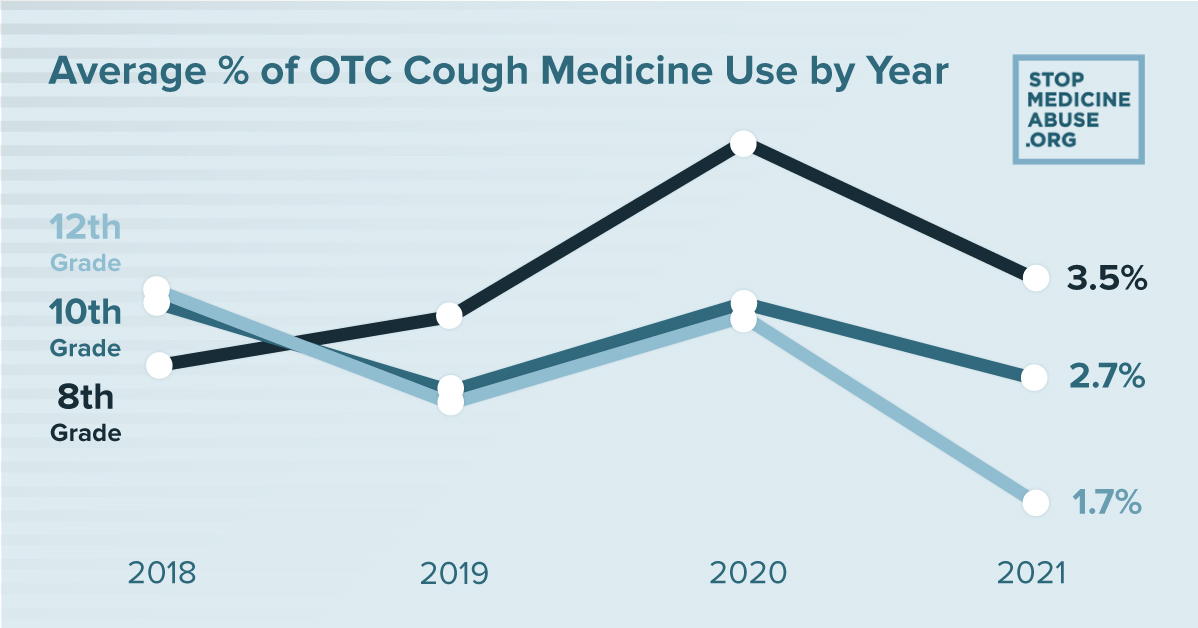New Survey Shows Significant Decline in Teen Abuse of OTC Cough Medicines & Other Substances in 2021
2021 was a year of many changes for adolescents including a return to in-person learning in the midst of the ever-evolving nature of the COVID-19 pandemic. While many hypothesized that the stressors caused by the pandemic would lead to an increase in substance abuse among adolescents, teens who reported substance abuse actually decreased significantly across the board in 2021.
According to the latest results from the Monitoring the Future survey of substance use behaviors and related attitudes among eighth, 10th, and 12th graders in the United States, 2021 findings represent the largest one-year decrease in overall illicit drug use reported since the survey began in 1975.
Looking at over-the-counter (OTC) cough medicine abuse specifically, the percentage of teens who reported misusing OTC medications dropped in all three grades surveyed. The highest drop being among 12th graders, where only 1.7% reported using OTC cough medicine to get high this year as compared to 3.2% of 12th graders in 2020.

Teen abuse of over-the-counter cough and cold medicine reached a historic low with an average of 2.7% of teens reporting abuse.
The Monitoring the Future survey, conducted by researchers at the University of Michigan, examines the trends and prevalence of adolescent substance abuse. Funded by the National Institute on Drug Abuse (NIDA), a division of the National Institutes of Health (NIH), the survey is given annually to students who self-report their substance use perceptions and behaviors.
Given the effects of the COVID-19 pandemic on the mental health of teenagers, the 2021 Monitoring the Future survey also asked students across all age groups about their mental health. Results found that students reported increases in feelings of anxiety and depression which started or increased during the pandemic. The survey’s findings are in alignment with a series of studies conducted by the U.S. Centers for Disease Control and Prevention (CDC) that reported that the percentage of mental health–related ER visits for children ages 12-17 rose by 31% between March 2020 and October 2020. There was also a more than 50% increase in ER visits related to suspected suicide attempts among girls ages 12-17 in early 2021 as compared to the same period in 2019.
Other notable findings from the 2021 Monitoring The Future survey include:
- Reported alcohol use within the past year decreased significantly for 10th grade and 12th grade students and remained stable for eighth graders.
- Marijuana use in all forms, including smoking and vaping, within the past year decreased significantly for students of all grades in the survey.
- And although vaping continues to be the predominant method of nicotine consumption among adolescents, the percentage of students who reported vaping nicotine within the past year decreased significantly for students in all three grades.
Although the results of this survey are positive, there is still work to be done to ensure these percentages continue to go down year-over-year. Having conversations with teens in your life is crucial to achieving this, as well as ensuring that you are taking care of your teen’s mental health (and your own).
Here are some tips to help you get started:
- Begin an open dialogue with your teen by taking a look at these tips for starting a conversation.
- Keep your household safe during the remainder of this year’s flu season by understanding these watchouts.
- Knowing that teens have reported poor mental health habits due to the ongoing COVID-19 pandemic, help your teen manage their feelings and keep spirits high.
- And as the pandemic continues, be sure to manage your own mental health with these coping tips for parents for when your teen shows signs of distress or boredom.
Take Action
Increased awareness can only mean increased prevention. Join us in the fight against teen cough medicine abuse by exploring and sharing our free resources.
